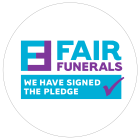- Home
- FAQ
The funeral
The chapel of rest refers to the dedicated space at the funeral directors where family and friends of the deceased can visit and spend time with their loved one. Unless the visit is soon right after the death where the body will be laid out on a raised bed, the person will be placed inside the coffin when taken to the chapel of rest.
Of course, you have the right to visit your loved one’s body. If for some reason the visit is not allowed, ask your funeral director for details. There may be circumstances where it will be distressing to see your loved one, if for example they are badly decomposed or they have been involved in an accident. If this is the case, you will be advised by your funeral director
prior to entering the chapel of rest and there may be options available which still allow you to spend time with the person.
Often when the body is already placed in the coffin, the person will look very peaceful. They will be washed and dressed in either the clothes that the family members have chosen or a simple gown . The funeral director will allow you to bring in your loved one’s personal effects such as make-up, jewellery, nail polish, hair gel, aftershave, false teeth and glasses etc
Yes, just let the funeral directors know so they can help and advise you during the process. They will also provide you with warm water, towels, essential oils, and other necessary items.
Yes. However, cremation regulations do not allow alcohol, large metal items, aerosols, glass, rubber or PVC to be put inside.
Not necessarily. Embalming will only be carried out when extended preservation of the body is required or special preparation is necessary. . . Embalming is an invasive process but can be useful and necessary in some cases, such as when the body needs to be refrigerated for more than 2 or 3 weeks, when the coffin needs to be opened during the service or when a person is being repatriated to another country.
Upon death
When someone dies at home and a medical professional has verified death, it is not necessary for the funeral directors to come and remove the body straight away. If you wish to spend time with your loved one prior to the funeral director attending, let them know of your wishes. This could be hours or days. It is advisable to keep the room cold, ventilated and the person’s skin cool and dry. The person is better laid on their back rather than sitting up in bed and it is advisable to cover the person’s face with a cloth when nobody is in the room for long periods.
The body will be stored in a cold room within the funeral home, and kept at a temperature which will assist preservation. If you wish to visit your loved one’s body, arrange your visit with the funeral director.
First, you need to secure the Medical Certificate of Cause of Death that a general practitioner has signed from his office. After having the medical certificate, you then contact the registrar’s office in the area where the death occurred to make an appointment.
If you can’t visit the registrar in the area where the death occurred, you can request registration by ‘Declaration’. Since this process relies on the Royal Mail or courier, you will have to wait for some time to have it processed.
Answer: All deaths that occurred in England, Wales and Northern Ireland have to be registered within 5 days, unless there is a Coroner involved. If it is impossible to do so, let’s say because you are out of the country when your loved one died, you will have to inform the Registrar and make the appointment in advance.
Funerals normally take place 7-14 days after death. While 5 days is doable, it does not allow unforeseen delays. If you feel like you need more time to plan the funeral, it is not unusual for funerals to take place 2-3 weeks after death. If a coroner is involved, a funeral cannot take place until they release the body to the funeral director and this can often cause a delay.
Funeral Service
If not in church, some families may choose to hold the service in crematorium chapels, village halls, private homes, gravesides, and other locations. Provided you get the venue owners permission, there is no reason why a funeral service has to take place in more traditional settings.
If the service is religious a minister would take the lead.
A service can also be led by a family member or an independent celebrant who can create a unique service for the deceased. Nowadays celebrants also give families the option to include some religious elements, such as prayer or bible reading.
Depending on the venue, services vary in length. A church service can last anything up to an hour. Most crematoriums allow 20 -40 minutes of use for their chapel. If you think more time is needed, you may book a double slot or speak with them about the funeral service arrangement. Other venues, such as social clubs and function rooms tend to have less time restrictions in place
The decision as to who will carry the coffin depends on the family. Families may choose to provide their own bearers or they may prefer to rely on professional bearers provided by the funeral director. . Funeral directors will conduct a clear briefing to family beforehand so they will know what and what not to do. They will also be on hand to assist the entire time.
Burial vs Cremation
The decision should be based on the family’s preference. Most funerals in the UK involve cremation. This is because aside from requiring less space, the process is also cheaper. It is carried out one body at a time so you can rest assured that the ashes you will receive are your deceased loved one’s. In terms of sustainability, burials use more land while cremation uses more energy.
Natural or green burials do not require embalming fluids, and the materials used for the coffin are biodegradable and eco-friendly.
Yes, once the deceased is placed inside the coffin, the body cannot be removed from it and it will be cremated as well.
Crematoriums need a minimum of 4 hours to complete the cremation process, however legally they have up to 72 hours to cremate a body. Some crematoria allow families to collect ashes, however the majority prefer the funeral director to collect them on the families behalf. Ashes are returned in a plastic or cardboard box, however if you prefer to have the ashes back in a casket, urn or scatter tube this can be arranged by the funeral director who will decant the ashes for you.
There are many options for ashes. You may scatter them , or have them interred in a new or existing family grave. You may choose to split the ashes amongst family members and have jewellery or other memorials made. If you wish to take ashes abroad, it is advisable to contact the funeral director who can guide you through the process.
Costs
The average price of a funeral in the UK is now £4,056 (Sunlife 2022) however this varies significantly depending on the options chosen by the family. Burial for example is more expensive than cremation if a new plot is purchased. The cheapest option is Direct Cremation where ther is no funeral service and mourners are not able to attend. Family will simply get the ashes returned to them after the cremation has taken place.
You can pay for the service via cash, cheque or bank transfer. The funeral director can send the funeral invoice directly to the deceased’s bank and obtain funds providing they have a copy of the death certificate. If families are struggling to pay for a funeral, payment plans over a set period of time may be an option with the funeral director. It is worth noting that if the person taking responsibility for the funeral is in receipt of a qualifying benefit, they may be eligible for a funeral expenses grant from the Department of Work and Pensions.
There are various reasons why it is good to consider paying for your funeral in advance. Funeral costs have been increasing every year, so if you have a life expectancy of more than 2 years and you want to take away the burden of your funeral from your family members and you have the savings, it makes sense to pay for it in advance. Funeral directors are willing to discuss with you the advantages and options you have for your own funeral.





Signature Funerals offer families choices which will enable them to create a personalised and tailored service reflective of the person who has died, whether that’s a service which is positive for the environment, a lively celebration of life, or a more formal, traditional approach.

Copyright • Signature Funerals Limited | Built By BWAR!
Privacy Policy | Terms and Conditions | Cookie Policy






